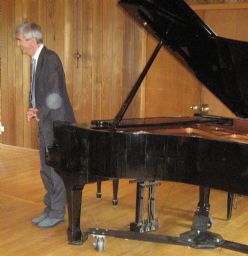|
Symphony
SRS SEASON ENDS WITH RESOUNDING TA-TA-TA-BANG
by Terry McNeill
Sunday, June 1, 2025
Symphony
YOUTHFUL VIRTUOSITY ON DISPLAY AT USO'S MAY CONCERTS
by Peter Lert
Saturday, May 17, 2025
Symphony
MYSTICAL PLANETS AND LIVELY GERSHWIN ORTIZ AT FINAL SRS CONCERT
by Peter Lert
Sunday, May 4, 2025
Symphony
VSO'S CONCERT MUSIC OF TIME, MUSIC OF PLACE
by Peter Lert
Sunday, April 27, 2025
Choral and Vocal
VOCAL ELEGANCE AND FIRE AT THE 222'S RECITAL APRIL 26
by Pamela Hicks Gailey
Saturday, April 26, 2025
CANTIAMO SONOMA SINGS AN INSPIRED GOOD FRIDAY MOZART REQUIEM CONCERT
by Pamela Hicks Gailey
Friday, April 18, 2025
DRAMATIC SHOSTAKOVICH SYMPHONY CLOSES PHILHARMONIC'S 25TH SEASON
by Terry McNeill
Sunday, April 13, 2025
LARGE COLLEGE OF MARIN AUDIENCE GREETS STOPHER ARTISTRY
by Terry McNeill
Saturday, April 5, 2025
Chamber
FRISSON DELIVERS SHIVERS OF DELIGHT
by Abby Wasserman
Sunday, March 30, 2025
OLD AND MOSTLY NEW IN SRS MARCH CONCERT IN WEILL
by Peter Lert
Saturday, March 22, 2025
|
 |
 Pianist Paul Roberts in Preston Hall July 11 |
ROBERTS PLAYS UNEVEN RECITAL AT MENDOCINO FESTIVAL
by Terry McNeill
Sunday, July 11, 2010
British pianist Paul Roberts played a recital in two disparate parts July 11 in Mendocino Music Festival’s piano series in Preston Hall.
Before 65 people Mr. Roberts planned the initial part around music of Ravel and Liszt, each with extensive descriptive titles. The pieces were preceded by a lengthy verbal introductions, set out in Mr. Roberts’ unique blend of historical description, philosophy, musical analysis and a sporadic dash of gossip. The pianist is a superb speaker, witty and at all times pithy and instructive. It’s refreshing to hear the English language fashioned so well. At times one wished for more piano playing and less education, but it’s a summer festival and the speaker knows the territory.
What the artist didn’t do well, at least until the intermission, is to play the piano at a high level. In Liszt’s “Au Lack Du Wallenstadt” the chosen tempo, as throughout the afternoon, was fine but the piano sound was muffled, the left hand indistinct under the simple melody. The same composer’s “Au bord d’une source” was heavily pedaled with a heavy touch and the line was broken by an extended pause. Aural memories came back to a Horowitz performance in Carnegie Hall of the same piece, awash with a shimmer of sound and delicate phrasing and half pedal. Shura Cherkassky’s rendition was also inimitable.
Ravel’s “Jeux d’eau” received a more idiomatic reading with fluid arpeggios and a “watery” cadenza. Two more Liszt works followed, the Sonetto del Petrarca No. 123 and the revised version of “Les Cloches de Genève.” Played from score, the former featured a modest tempo and even but slow trills, the melodic line imaginatively played and the final note lingering and almost inaudible. The faster parts of “Cloches” strained the pianist’s technique, the imperfect pedaling enhancing the overy loud statement of the second theme. These “bells” had neither the tenderness at the opening nor heroism in the octave passages.
Often in the first half playing above forte produced a harsh tone and a less-than-polished conception, but with Debussy everything changed. Here Mr. Roberts was in his element. He recently authored an acclaimed biography of the composer, but that’s no insurance that he can play in Debussy the layers of refined sound with unusual pedal effects at a virtuoso level. Worry not, as the Roberts conception of the French master’s music was an ideal combination of head and heart. Beginning with “L’isle joyeuse” and finishing with the iconic “Children’s Corner” Suite, all was in harmonious order. The piano tone became more richly hued, the digital command more secure. “Gradus ad Parnassum” built to a toccata conclusion, the accelerando at the end forceful but without harshness. The set unfolded in a masterly way, each of the six pieces fashioned with long study and a sure touch. I particularly liked the inner voices and accurate skips from “Jimbo’s Lullaby” and the repose and syncopated jazz harmonies of “Golliwog’s Cake-Walk.”
Two additional Debussy works were offered, the short and mysterious “Canope” and “Les collines d’Anacapri.” The latter is from the first book of Preludes (1910) and the folk like material was performed with a lively and bright palette. Debussy has a consummate interpreter in Paul Roberts.
No encore was offered.
|

